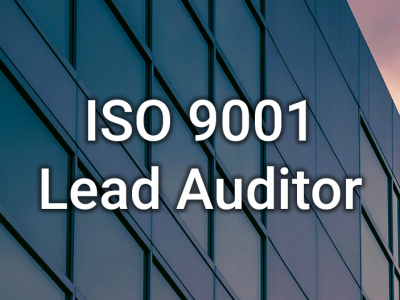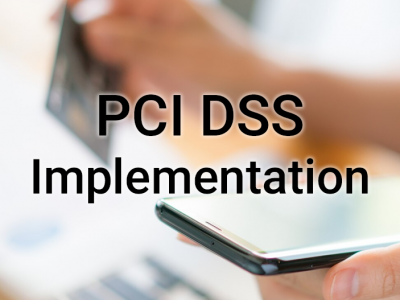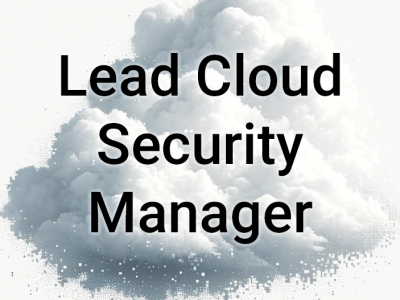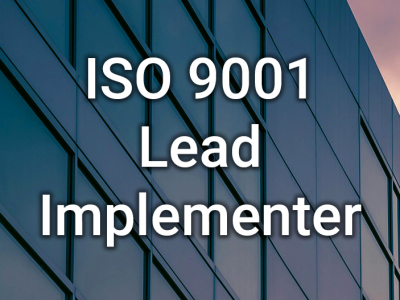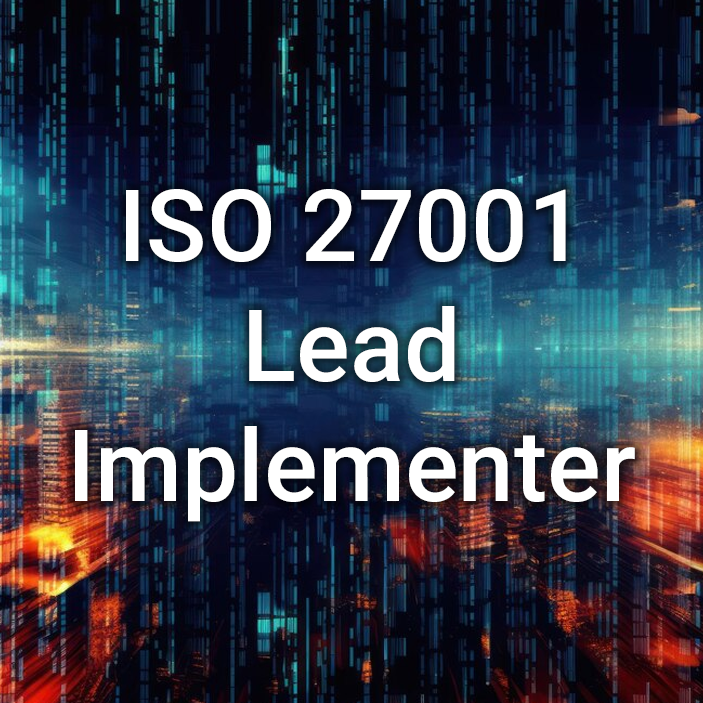ISO/IEC 27001 Lead Implementer
Attend the Lead Implementer course on mastering the implementation and management of an Information Security Management System based on ISO/IEC 27001
Overview
COURSE DESCRIPTION
This five-day intensive course allows participants to gain the necessary expertise for organizing and implementing an Information Security Management System (ISMS) based on ISO/IEC 27001:2013. Participants will also acquire a comprehensive understanding of best practices used for managing information security across all sections of ISO/IEC 27002. This training aligns with project management practices outlined in ISO 10006 (Quality Management Systems – Guidelines for Quality Management in Projects). Moreover, this course is fully compatible with ISO/IEC 27003 (Guidelines for the Implementation of an ISMS), ISO/IEC 27004 (Measurement of Information Security), and ISO/IEC 27005 (Risk Management in Information Security).
CERTIFICATION
Upon completion of the course, should you pass the exam successfully, you will receive an internationally recognized certificate.
LEARNING OBJECTIVES
- To understand the implementation of an Information Security Management System in accordance with ISO/IEC 27001
- To gain a comprehensive understanding of the concepts, approaches, standards, methods and techniques required for the effective management of an Information Security Management System
- To understand the relationship between the components of an Information Security Management System, including risk management, controls and compliance with the requirements of different stakeholders of the organization
- To acquire the necessary expertise to support an organization in implementing, managing and maintaining an ISMS as specified in ISO/IEC 27001
- To acquire the necessary expertise to manage a team implementing ISO/IEC 27001
- To develop the knowledge and skills required to advise organizations on best practices in the management of information security
- To improve the capacity for analysis and decision making in the context of information security management
PREREQUISITES
ISO/IEC 27001 Foundation Certification or a basic knowledge of ISO/IEC 27001 is recommended.
EDUCATION APPROACH
- This training is based on both theory and practice.
- Sessions of lectures illustrated with examples based on real cases.
- Practical exercises based on a full case study including role playings and oral presentations.
- Review exercises to assist the exam preparation.
- Practice test similar to the certification exam.
GENERAL INFORMATION
- The certification fee is included in the cost of the exam.
- Participants will be issued with a CPD (Continuing Professional Development) certificate.
- In case of failure to pass the exam, participants are allowed to take the exam free of charge under certain conditions.
COURSE AGENDA
- Section 1: Training course objectives and structure
- Section 2: Standards and regulatory frameworks
- Section 3: Information Security Management System (ISMS)
- Section 4: Fundamental information security concepts and principles
- Section 5: Initiation of the ISMS implementation
- Section 6: Understanding the organization and its context
- Section 8: Leadership and project approval
- Section 9: Organizational structure
- Section 10: Analysis of the existing system
- Section 11: Information security policy
- Section 12: Risk management
- Section 13: Statement of Applicability
- Section 14: Documented information management
- Section 15: Selection and design of controls
- Section 16: Implementation of controls
- Section 17: Trends and technologies
- Section 18: Communication
- Section 19: Competence and awareness
- Section 20: Security operations management
- Section 21: Monitoring, measurement, analysis, and evaluation
- Section 22: Internal audit
- Section 23: Management review
- Section 24: Treatment of nonconformities
- Section 25: Continual improvement
- Section 26: Preparing for the certification audit
- Section 27: Closing of the training course
A two-hour exam
COURSE DATES AVAILABLE FOR REGISTRATION
ASK OR REGISTER
Do you have questions about the course? — Please fill in your details and we will contact you.
Frequently Asked Questions
PECB credentials are internationally recognized and endorsed by many accreditation bodies, so professionals who pursue them will benefit from our recognition in domestic and international markets.
The value of PECB certifications is validated by the accreditation from the International Accreditation Service (IAS-PCB-111), the United Kingdom Accreditation Service (UKAS-No. 21923) and the Korean Accreditation Board (KAB-PC-08) under ISO/IEC 17024 – General requirements for bodies operating certification of persons. The value of PECB certificate programs is validated by the accreditation from the ANSI National Accreditation Board (ANAB-Accreditation ID 1003) under ANSI/ASTM E2659-18, Standard Practice for Certificate Programs.
PECB is an associate member of The Independent Association of Accredited Registrars (IAAR), a full member of the International Personnel Certification Association (IPC), a signatory member of IPC MLA, and a member of Club EBIOS, CPD Certification Service, CLUSIF, Credential Engine, and ITCC. In addition, PECB is an approved Licensed Partner Publisher (LPP) from the Cybersecurity Maturity Model Certification Accreditation Body (CMMC-AB) for the Cybersecurity Maturity Model Certification standard (CMMC), is approved by Club EBIOS to offer the EBIOS Risk Manager Skills certification, and is approved by CNIL (Commission Nationale de l’Informatique et des Libertés) to offer DPO certification.
All certification candidates are responsible for their own study and preparation for the examination. No specific set of courses or curriculum of study is required as part of the certification process. Likewise, the completion of a course or program of study will significantly enhance your chance of passing a PECB certification examination. To learn more about exams, competency domains and knowledge statements please go to: PECB Exam Preparation Guides.
The exam is conducted online using the PECB Exams app
You will have the opportunity to choose a convenient date and time from the list of proposed slots.
Candidates will be required to arrive at least 30 minutes before the start of the certification exam. Candidates arriving late will not be given compensatory time for the late arrival and may be denied to enter the exam. All candidates are required to present a valid identity card such as a national ID card, driver’s license, or passport to the invigilator. The duration of the exam varies according to the type of examination taken (see description of the different exams for more details). Additional time can be provided to candidates taking the exam in a language different than their mother tongue (when requested by the candidates, on the exam day).
For more information about exam details, please visit Examination Rules and Policies
Results will be communicated by email within a period of 6 to 8 weeks from your examination date. The candidate will be provided with only two possible examination results: pass or fail, rather than an exact grade.
In case of a failure, the results will be accompanied with the list of domains where the candidate failed to fully answer the question. This can help the candidate better prepare for a retake the exam.
To qualify for PECB credentials, candidates must not only pass the exam but also meet certain educational and professional prerequisites. Each PECB certification has specific education and a set of experience requirements.
Candidates are required to fill out the online Certification Application Form, and fill out all other online forms (that can be accessed via their PECB online profile), including contact details of references who will be contacted to validate the candidates’ professional experience. Lastly, before the submitting the application, a candidate can choose to pay online or be billed. In case the candidate needs additional information, he/she should contact accounting@pecb.com and/or certification@pecb.com.
The approval of the application occurs as soon as the Certification Department validates that you fulfil all the certification requirements regarding the credential you have applied for. An email will be sent to the email address you provided during your application process to communicate you application status. If approved, you will then be able to download your certificate from your member account.
PECB certifications are valid for three years. To maintain the certification, the applicant shall demonstrate every year that he/she is still performing tasks that are related to the certification. PECB Certified professionals shall annually provide PECB with the number of hours of auditing and/or implementation related tasks they have performed, along with the contact details of individuals who can validate such tasks. Additionally, certified professionals should regularly pay the annual PECB certification maintenance fees.
A notification email is sent to our certified members, who are required to submit their Continuing Professional Development (CPD) along with the Annual Maintenance Fee (AMF) three months before the annual date of their certification. The PECB certified members will then be able to submit their CPDs by visiting their account and providing the required information for the respective certification.
You May Like
ISO 37001 Transitional
The ISO 37001:2025 Transition training course helps participants thoroughly understand the differences between ISO 37001:2016 and ISO 37001:2025
ISO 9001 Lead Auditor
ISO 9001 Lead Auditor training enables you to develop the necessary expertise to perform a Quality Management System (QMS) audit by applying widely recognized...
PCI DSS Implementation
This two-day course equips participants with theoretical knowledge and practical skills to implement processes following PCI DSS requirements
Lead Cloud Security Manager
Master the implementation and management of the cloud security program based on ISO/IEC 27017 and ISO/IEC 27018
ISO 9001 Lead Implementer
ISO 9001 Lead Implementer Course enables you to develop the expertise to support an organization in implementing/managing a Quality Management System


